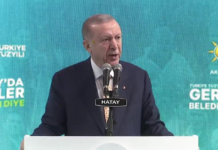Properties belonging to eight of the media outlets that the Turkish government seized under post-coup emergency rule have been put up for sale by the state-run Savings Deposit Insurance Fund (TMSF) on Thursday. TMSF listed properties belonging to Can Erzincan, Barış and Ört TV stations, and Nazar, Yerel Bakış, Turgutlu Havadis, Taraf newspapers along with Özgür Radio station to be sold at auction.
TMSF has said in a statement on Thursday that broadcasting licenses of Can Erzincan, Baris and Ört television stations are to be sold as well. Six of 8 media outlets TMSF put up for sale on Thursday were also listed among 9 companies that would be sold, in a separate announcement on May 31.
A total of 942 private companies with a total value of TL 40.5 billion [$11.45 billion] in assets have been transferred to TMSF since a July 15, 2016 coup attempt. The companies in question were mostly targeted as part of a sweeping state crackdown against the Gülen movement. Among the seized companies are more than 160 media outlets that used to have critical editorial policies toward the Turkey’s autocratic President Recep Tayyip Erdoğan’s the Justice and Development Party (AKP) government.
Turkey is the leading jailer of journalists in the world. The Stockholm Center for Freedom (SCF) has documented that 263 journalists are now in jails as of June 24, most in pre-trial detention languishing in notorious Turkish prisons without even a conviction. Of those in Turkish prisons, 239 are arrested pending trial, only 24 journalists remain convicted and serving time in Turkish prisons. An outstanding detention warrants remain for 105 journalists who live in exile or remain at large in Turkey.
Detaining tens of thousands of people over alleged links to the movement, the government also closed down more than 180 media outlets after the controversial coup attempt.
Turkey survived a controversial coup attempt on July 15, 2016 that killed over 240 people. Immediately after the putsch, the Justice and Development Party (AKP) government along with President Erdoğan pinned the blame on the Gülen movement.
Fethullah Gülen, who inspired the movement, strongly denied having any role in the failed coup and called for an international investigation into it, but President Erdoğan — calling the coup attempt “a gift from God” — and the government initiated a widespread purge aimed at cleansing sympathizers of the movement from within state institutions, dehumanizing its popular figures and putting participants of the Gülen movement in jails.
At least 161,751 people were detained or investigated and 50,334 people were arrested in Turkey in the framework of the Turkish government’s massive post-coup witch hunt campaign targeting alleged members of the Gülen movement since the controversial coup attempt on July 15, 2016, according to statistics reported by state-run Anadolu news agency by basing on information taken from the officials from Turkey’s Justice Minsitry on June 13. (SCF with turkeypurge.com) June 24, 2017
















